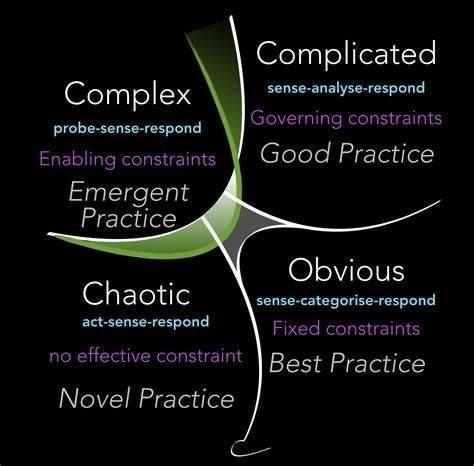
Action is the Foundational Key to All Success - But Knowing Which Action to Take is Half the Battle
Pablo Picasso once said “action is the foundational key to all success.”
It almost goes without saying … that to get anything done, to achieve any goal, you need to do something. Whether it be looking for work in the time of COVID-19, trying to get your kids to do their homework, or launching a make or break product, it's all about action. Action is king.
But that’s only partially true …. success is not just about taking action … Success is about taking the right action.
So then the question becomes … How do we choose the right action? Are there simple strategies that we can all use that will boost our abilities to make better decisions, and make us more likely to succeed in accomplishing our goals. And the answer is a resounding yes.
According to the Cynefin model by Dave Snowden, there are 4 classes of problems that we all face every day, and knowing what kind of problem we are facing, gives us insight into how to best approach them.
To begin with, we have simple or obvious problems. Simple problems are problems that have an obvious solution. The solution just pops into your mind without much cognitive effort. Your car is running out of petrol, what do you do? You take it to a petrol station …. simple. For simple problems, it's about detecting and categorizing the problem, and using best practice.
The second class of problems are complicated. With complicated problems, the world is still predictable enough to come up with good solutions, but they don’t just pop into mind, you need to think it through. You need to analyze the situation… and often with expert knowledge. This is the domain of engineers, surgeons, mechanics, analysts and other experts. For example, in building a bridge, fixing your fridge, or calculating your taxes … a solution can be found through analysis. To help solve complicated problems, you can always call in an expert, if it's out of your own domain of knowledge.
The next class of problems are complex problems. Complex problems are problems where you don’t have a good enough mental model of the world to predict the best course of action. The world itself is its own best model. In these situations, you can’t think your way forward…. you need to experiment your way forward. You need to actively interact with the world, to see what the world has to offer. For example, in exploring your business model, there are many assumptions you need to test, from what are the actual pain points of your customers and how to best address them, through to exploring what customer segments you should best target, and what your best channels to market might be. For complex problems, you can’t think your way forward … you need to experiment your way forward … you need to actively explore what does and doesn’t work in practice. And because these are experiments, you need to embrace failure as part of the process, and conduct these experiments in a safe-to-fail manner.
Now, what is interesting, is that many of our leadership and personal challenges are complex in nature. There is no rule book that can tell you how to best motivate your staff, or how to have the most successful marriage possible, or how to best raise your children. There are perhaps some useful ideas you can play with, but what works best for you in your given context is something that you need to experiment with. And your context and the people or companies in it may evolve over time. You need to make reflective practice part of your ongoing routine.
It's ok for you not to know exactly what to do. That’s the nature of complexity. In a complex world you simply can't think your way forward, you need to experiment your way forward.
The last class of problems are chaotic. And this is like COVID-19, in that there was no time to think or experiment your way forward to a good solution. Like with COVID… you need to act immediately to contain the problem … such as introducing social distancing and working from home protocols. And from this containment, it moves the issues into the other domains… for example, exploring how best to work from home.
Are you using the right approach?
Now although there are 4 strict problem domains in the Cynefin model, a lot of the time, we are in the 5th space … we are in a state of disorder - we don’t actually know which state we are in, and as such, might be using the wrong approach. You might think you are an expert, but are toying with a complex problem where expertise alone is not enough.
So the utility of the Cynefin model is the idea that given a challenge in your work or personal lives, knowing which type of challenge you are facing will give you important information about how to best approach it.
The simple take-home message:
Action IS the foundational key to all success, but knowing what class of problem you are facing, will help you better determine what action you should take and better maximize your chances of success.
Trending
-
1 SEO Mistakes That Could Be Costing Your Shopify Store Sales
Daniel Hall -
2 Strategies for Safeguarding Assets and Investments
Daniel Hall -
3 The Role of PR Firms in Crisis Management and Damage Control
Nitish Mathur -
4 The Competitive Landscape of Low-Cost Carriers in Belgium: TUI Fly Belgium’s Position
Daniel Hall -
5 How to Make Appealing Visuals for Your E-commerce Store
Daniel Hall






Comments